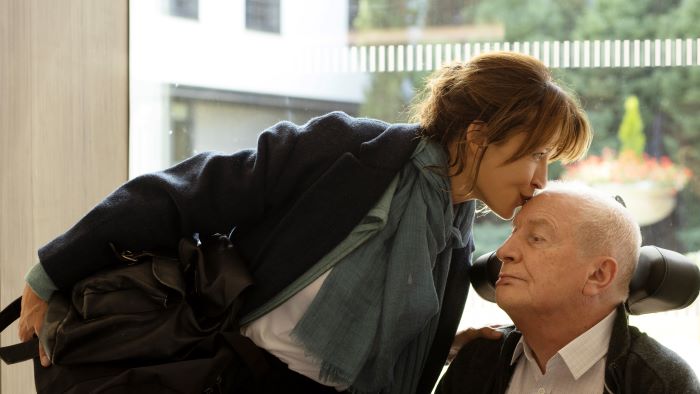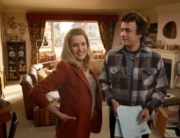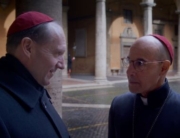In Everything Went Fine—based on a 2013 memoir by Emmanuèle Bernheim—François Ozon eschews nearly every trace of sentimentality a lesser director would leave in. Nevertheless, he pulls no punches chronicling the heart-wrenching attempts of two middle-aged daughters to honor their elderly father’s directive that, following a debilitating stroke, he wants to end his life on his own terms. As Emmanuèle (played with exemplary tact and emotional honesty by Sophie Marceau) and Pascale (a heartfelt Géraldine Pailhas) reconcile their contradictory feelings about their father, André, they care for him while planning his assisted suicide. The main focus is on Emmanuèle, whose relationship with André has been marked by emotional abuse since she was young.
André, a successful factory owner and modern-art collector, has always been self-centered and uncaring, and this continues from his hospital bed, as he spits out nasty comments at his daughters, wife Claude, and a presumptive ex-boyfriend Gérard (Grégory Gadebois), a ne’er-do-well whom Emmanuèle and Pascale nickname Shithead. Emmanuèle is still spooked by her father’s treatment of her as a child, which Ozon astutely reveals in smartly infrequent flashbacks that—for example—depict André mocking his young daughter both for being unable to read a map and making him stop the car for an emergency bathroom break.
Still, Emmanuèle admits she loves her father despite his often inexcusable behavior. At dinner at his favorite restaurant, she is flabbergasted when he says to her, “You were such an ugly child,” that all she can do, after the initial shock, is laugh. Such complexity of feeling appears when she talks to her mother, Claude. Emmanuèle asks her why she never left him. “Because I loved him,” Claude responds, then after a moment looks at her daughter incredulously and sneers, “Silly girl.” (Earlier, Claude—a glorified cameo by Charlotte Rampling, who’s quietly riveting in her few scenes—trades insults with her husband at the hospital in a way that says much about their relationship: “Your father doesn’t look too bad,” she dryly says, as André lies in bed in front of her and their daughters, visibly affected by his stroke.)
It’s to Ozon’s credit that neither he nor his characters get caught up in the moralistic side of the debate over assisted suicide. The daughters, particularly Emmanuèle, have enough legal and logistical hurdles to go through, and their initial reluctance stems not because they are morally opposed but because they simply don’t want their father to die. Since euthanasia is also illegal in France, they must find another way. Online, Emmanuèle contacts a woman (Hanna Schygulla) in Switzerland who will take care of all the arrangements.
There are moments when Ozon skirts, but adroitly avoids, melodrama. André (played brilliantly by André Dussollier, whose intensely physical and fiercely visceral performance is astonishing) asks to postpone his final trip to Switzerland so he can hear his teenage grandson—Pascale’s child—play a clarinet recital. But when he attends and listens to his grandson’s solo, he promptly falls asleep. (Ozon’s film is very musical even without a lot of music, as there is no original score. André loves a particular Brahms piano sonata, so Emmanuèle starts listening to it herself, while the Beethoven clarinet piece we hear during the grandson’s recital returns, wistfully, over the end credits.)
A healthy dose of gallows humor sharply undercuts the pain of this emotionally draining experience—for the characters and viewers. After André first tells Emmanuèle he wants to end his life, Pascale suggests to her sister that André’s request is actually a gift for Emmanuèle, since the latter was always wishing him dead when she was younger. To which Emmanuèle replies, almost exasperatedly, “An asshole, right to the end.”
At a pivotal point in the family’s plan to carry out Andrè’s wishes, the father looks Emmanuèle in the eye and says matter-of-factly, “No crybabies.” This is followed by the final shot of Emmanuèle, teary-eyed but resolute, an example that André’s version of tough love did work, at least he would have selfishly thought so.







Leave A Comment